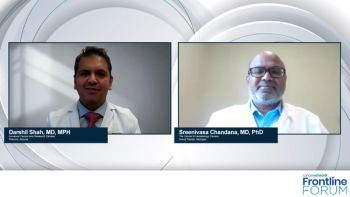Articles by Darshil Shah, MD, MPH

Panelists discuss how dose reductions in the NAPOLI-3 trial paradoxically led to improved survival outcomes (12.6 months for nanoliposomal irinotecan reductions and 13.5 months for oxaliplatin reductions vs shorter survival with full doses), supporting their clinical approach of maintaining patients on tolerable doses for longer treatment duration rather than pursuing maximum dose intensity.

Panelists discuss how UGT1A1 mutations may predict increased diarrhea risk in patients receiving NALIRIFOX, with genetic testing potentially valuable for identifying patients who need more aggressive supportive care or dose modifications, particularly those with borderline performance status.

Panelists discuss how real-world retrospective data from the Flatiron Health Database showed median overall survival of approximately 9 months for FOLFIRINOX-treated patients, which appears numerically lower than NALIRIFOX results, though these findings require cautious interpretation due to the nonrandomized nature of the comparison.

Panelists discuss how adverse event profiles differ between regimens—with FOLFIRINOX causing high rates of neutropenia and neuropathy and NALIRIFOX showing lower neuropathy rates but higher grade 3 diarrhea—making patient-specific factors crucial for treatment selection and emphasizing the importance of dose adjustments and patient education.

Panelists discuss how the NAPOLI-3 trial led to FDA approval of NALIRIFOX after demonstrating superior median overall survival (11.1 months) and progression-free survival (7.4 months) compared with gemcitabine/nab-paclitaxel, with key differences from the older PRODIGE 4 study including a lower oxaliplatin dose that may reduce adverse effects.

Panelists discuss how the current first-line treatment landscape for metastatic pancreatic adenocarcinoma includes NCCN-recommended regimens like FOLFIRINOX, gemcitabine plus nab-paclitaxel, and newest addition NALIRIFOX, with treatment selection guided by toxicity profiles, patient-specific factors, and the importance of germline testing.



